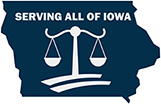Last Updated: 4/10/2025
The Iowa Department of Transportation reports an average annual decline of fatal car accidents in Iowa since 2007. Even so, 365 people died in 2012 in Iowa car crashes, and more than 300 victims died in 2013.
Even a non-fatal accident can bring life-altering consequences for a victim and his or her family. Personal injury compensation may be available to you to address medical bills, permanent disability, lost wages and more.
We understand you have many questions after a serious auto accident in Iowa. Below is a guide to understanding some of the most urgent matters in a car accident claim.
What should I know about car insurance in Iowa?
Unlike many states, there is no compulsory auto insurance law in Iowa. The state instead has adopted the Financial and Safety Responsibility Act, which requires drivers to prove financial responsibility in the event of an accident. For most drivers, though, this means purchasing auto insurance coverage.
An auto insurance policy in Iowa must meet the following minimum criteria:
- Bodily Injury Liability – $20,000 limit per person and $40,000 per accident; and
- Property Damage Liability – $15,000 per accident.
Additional coverage options are available to drivers willing to pay higher monthly premiums. Some of the most popular options include:
- Uninsured Motorist -- this covers you in the event of an accident with a hit-and-run driver or when the at-fault driver lacks insurance;
- Underinsured Motorist -- applies when a driver has insufficient coverage to meet your medical or property damage needs; and
- Medical Payments -- provides some coverage for medical expenses for the insured driver and his or her passengers.
You first may turn to the at-fault driver’s bodily injury and property damage liability coverage in the event of an accident. This will require you to prove the driver was at fault for your accident and injuries.
Additional compensation may be available through your own insurance policy and/or by pursuing a personal injury action against a liable driver.
How much time do I have to initiate legal action after a car accident?
Iowa’s statute of limitations is covered under Iowa Code §614.1, which provides two years in which to take legal action after an automotive accident. Bear in mind, the longer you wait to initiate a claim, the greater the chances evidence will be lost or destroyed.
What evidence is necessary for my claim?
A personal injury claim or lawsuit must establish negligence, liability and damages. This can be accomplished with the presentation of evidence that may include:
- police accident report (reports may be purchased for $5 from the Des Moines Police Department);
- photos of the accident scene;
- medical bills and records;
- income records (to prove lost wages);
- witness reports; and
- more.
An attorney can help you determine what evidence is necessary to verify your claim. Your car accident lawyer may be able to help you collect evidence so you can focus on your recovery.
What type of compensation is available for my injuries?
The insurance companies and/or courts will base the value of your claim on such factors as:
- necessary medical care;
- lost income;
- pain and suffering;
- permanent disability;
- scarring;
- out-of-pocket expenses; and
- property damage.
Iowa’s comparative negligence law means you can recover compensation even if you are partially at fault for your accident. You may not, however, collect damages if you were more than 50 percent to blame for the crash. Additionally, your final award will be reduced in direct correlation to the percentage of fault assigned to you.
I am ready to take action. What is my first step?
You may start by ordering our free insider’s guide to Iowa car accidents. Or you may call Walker, Billingsley & Bair to schedule a free case evaluation in Des Moines with a car accident lawyer – (888) 435-9886.


